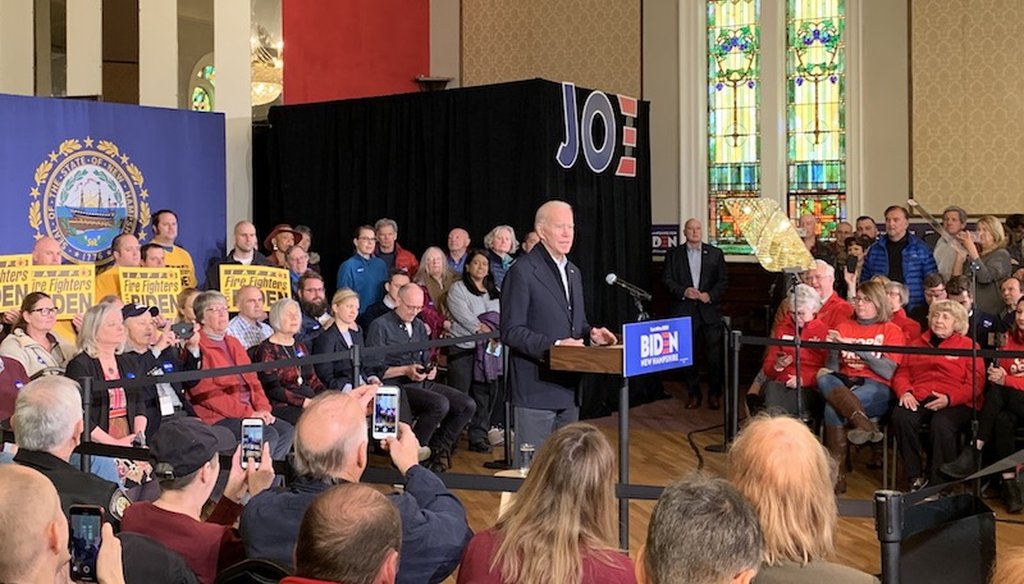Stand up for the facts!
Our only agenda is to publish the truth so you can be an informed participant in democracy.
We need your help.
I would like to contribute

Former Vice President speaks to a small crowd of 200 people in Somersworth, N.H. on Feb. 5, 2020. (Josie Hollingsworth/PolitiFact)
SOMERSWORTH, N.H. — Joe Biden did not, in his words, "sugarcoat" his failure to finish in the top three in Iowa.
"We took a gut punch," he told supporters in a turn-of-the-century ballroom. "I know there are an awful lot of folks out there who are trying to write off this campaign. Well, I’ve got news for them. I’m not going anywhere."
As he has from the start, Biden emphasized his experience and his skill at turning ideas into signed laws. He contrasted himself on both fronts with Pete Buttigieg and Sen. Bernie Sanders, the two apparent leaders in Iowa.
In a dig at Buttigieg, the former mayor of South Bend, Ind., Biden said taking on the presidency was no place for on-the-job training. And for Sanders, he derided his "Medicare for All" plan as not merely hugely expensive, but as a bill that is "not going anywhere."
"He has yet to move the ball a single solitary inch in the United States Congress," Biden said.
Sign up for PolitiFact texts
PolitiFact is traveling through New Hampshire this week to fact-check Democratic candidates ahead of the state’s Feb. 11 primary.
RELATED: We analyzed the stump speeches of Pete Buttigieg, Amy Klobuchar, Bernie Sanders, Elizabeth Warren, Joe Biden and Donald Trump.
We fact-checked several of Biden’s statements in Somersworth, including direct aims at Sanders.
Sanders did make this remark in a Jan. 24 CBS interview when asked about the cost of his multi-pronged agenda, which includes "Medicare for All." Here’s the exchange with "CBS Evening News" anchor Norah O'Donnell:
O'Donnell: "Your agenda has promised free health care for everybody, free college tuition, and to pay off people's college loans. The price tag for that is estimated to be $60 trillion over ten years, correct?"
Sanders: "Well, look. We have political opponents."
O'Donnell: "You don't know… You don't know how much your plan costs?"
Sanders: "You don't know. Nobody knows. This is impossible to predict."
O'Donnell: "You're going to propose a plan to the American people, and you're not gonna tell 'em how much it costs?"
Sanders: "‘Course I will. Do you know exactly what health care costs will be, one minute, in the next 10 years if we do nothing? It will be a lot more expensive than a Medicare for All single-payer system."
This is aimed at Sanders, and it is True. We looked into this back in 2015 when Hillary Clinton made the same claim during a Democratic primary presidential debate.
The Brady Handgun Violence Prevention Act mandated a five-day waiting period for background checks for gun purchases.
The bill underwent many transformations before it became law in 1993. Sanders, then Vermont’s sole representative in the U.S. House, voted against the bill in its entirety five times, from 1991 to 1993.
The Sanders campaign in 2015 said Sanders voted against the bill because he was against a national waiting period and had to answer to the people of Vermont, a rural state with high gun ownership.
The night before Biden spoke in Somersworth, Sanders told his supporters he would end "the sale and distribution of assault weapons."
RELATED: Fact-checking Bernie Sanders in Milford, NH before the primary
This exaggerates gun makers’ legal protections. A 2005 law protects gun dealers and manufacturers from lawsuits when their products are misused. For example, if a person buys a gun legally and then uses the gun to intentionally kill someone, the gun dealer and manufacturer cannot be held liable for the crime under the law.
But in other cases, they can be sued. The law does not protect gun dealers who transfer a gun knowing it would be used for criminal purposes, nor those who knowingly break state or federal law if the violation results in harm. And gun makers remain vulnerable to defective product suits.
Biden was also off target when he said only the gun industry has this protection. Congress gave liability relief to online service providers, small aircraft makers, and vaccine makers, and the nuclear industry benefits from a $13 billion cap on damages from an accident.
This is True. While a non-binding resolution passed the Senate in 1985, Biden’s Global Climate Protection Act, which called on the president to set up a task force to plan how to mitigate global warming, became the first such law in 1987.
At the time, Biden warned that "even a small rise in temperature could disrupt the entire complicated environment that has nurtured life as we know it."
His bill, however, demanded little. One professor described it as a "plan to make a plan," and it never materialized.
This is accurate. The Emissions Database for Global Atmospheric Research shows that for 2018 the United States produced about 14% of greenhouse gas emissions, compared to about 30% for China, the largest emitter.
This is Mostly True. From 2013, the year before the Affordable Care Act took effect, to 2017, the number of Americans with health insurance increased by 26.6 million, according to an analysis from the Kaiser Family Foundation, a nonprofit that focuses on health care policy.
But the Affordable Care Act doesn’t necessarily take all the credit for that change. Gains in Medicare and from employer-sponsored health care account for a portion of that increase in the insured population.
Our Sources
Sources linked within the story.

























































